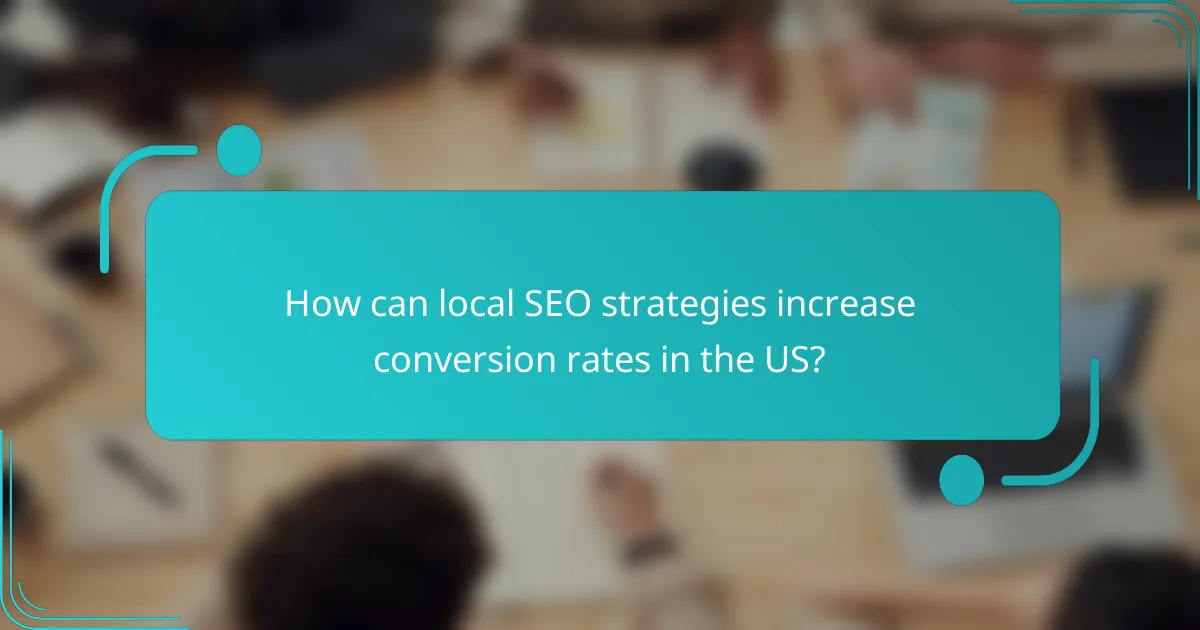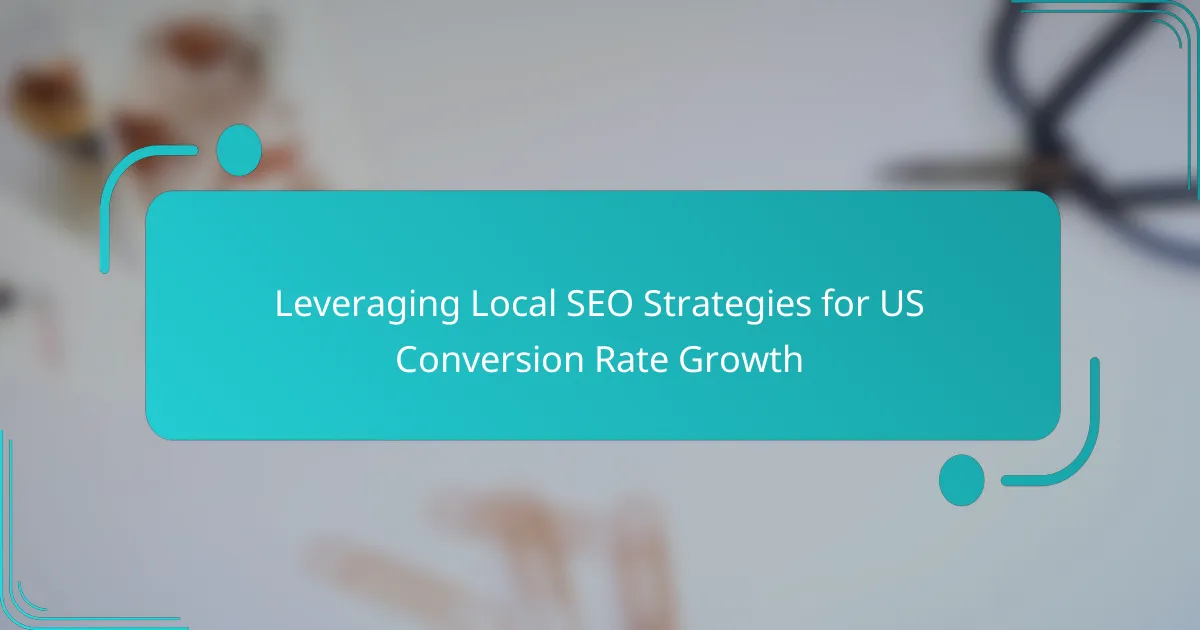Leveraging local SEO strategies is crucial for businesses aiming to enhance their conversion rates in the US market. By optimizing for local searches, companies can increase their visibility and attract relevant traffic, ultimately connecting with nearby customers who are more likely to make a purchase. Key practices, such as optimizing Google My Business and conducting targeted local keyword research, play a vital role in driving these conversions.

How can local SEO strategies increase conversion rates in the US?
Local SEO strategies can significantly boost conversion rates in the US by enhancing visibility in local search results and attracting more relevant traffic. By optimizing for local searches, businesses can connect with nearby customers who are more likely to convert into paying clients.
Targeted keyword optimization
Targeted keyword optimization involves identifying and using keywords that potential customers are searching for in your local area. Focus on long-tail keywords that include location-specific terms, such as “best pizza in Brooklyn” or “affordable plumbing services in Austin.” This approach helps in ranking higher in search results relevant to your business.
Utilize tools like Google Keyword Planner or SEMrush to find keywords with good search volume and low competition. Regularly update your keyword strategy based on changing trends and customer behavior to maintain relevance.
Google My Business enhancements
Enhancing your Google My Business (GMB) listing is crucial for local SEO success. Ensure that your GMB profile is fully completed with accurate information, including your business name, address, phone number, and operating hours. Adding high-quality images and responding to customer inquiries can also improve engagement.
Regularly update your GMB with posts about promotions or events, as this can increase visibility in local searches. Encourage satisfied customers to leave positive reviews, as higher ratings can lead to better rankings and increased trust from potential clients.
Localized content creation
Creating localized content helps attract and engage your target audience effectively. This can include blog posts, articles, or videos that address local issues, events, or interests. For example, a landscaping business could write about seasonal gardening tips specific to the local climate.
Incorporate local landmarks, culture, and community events into your content to resonate with your audience. This not only improves SEO but also builds a connection with potential customers, making them more likely to choose your services.
Mobile optimization
Mobile optimization is essential, as a significant portion of local searches is conducted on mobile devices. Ensure that your website is responsive, loads quickly, and provides a seamless user experience on smartphones and tablets. A mobile-friendly site can lead to higher engagement and conversion rates.
Consider implementing features like click-to-call buttons and easy navigation to enhance the mobile experience. Regularly test your site’s performance on various devices to identify and fix any issues that may hinder user experience.
Customer review management
Effective customer review management can significantly influence conversion rates. Actively encourage satisfied customers to leave reviews on platforms like Google, Yelp, and Facebook. Positive reviews not only enhance your online reputation but also improve your local search rankings.
Respond to reviews, both positive and negative, to show that you value customer feedback. Addressing concerns promptly can turn a negative experience into a positive one, fostering trust and loyalty among potential customers.

What are the best practices for optimizing Google My Business?
Optimizing Google My Business (GMB) is essential for improving local search visibility and driving conversions. Key practices include ensuring accurate business information, regularly updating posts, and actively engaging with customer reviews.
Accurate business information
Providing accurate business information on your GMB profile is crucial for attracting local customers. This includes your business name, address, phone number, and operating hours. Ensure that these details are consistent across all online platforms to avoid confusion.
Regularly check and update your information, especially if there are changes such as new hours or a new location. Inconsistent information can lead to lost customers and negatively impact your search rankings.
Regular post updates
Posting updates on your GMB profile keeps your audience informed and engaged. Share news about promotions, events, or new products to encourage customer interaction. Regular updates can help maintain your visibility in local search results.
Consider posting at least once a week to keep your content fresh. Use high-quality images and clear calls to action to enhance engagement and drive traffic to your website or physical location.
Engaging with customer reviews
Responding to customer reviews is vital for building trust and credibility. Acknowledge positive feedback and address any negative comments promptly and professionally. This shows potential customers that you value their opinions and are committed to improving your services.
Encourage satisfied customers to leave reviews, as a higher volume of positive reviews can significantly boost your local search ranking. Aim for a balanced approach by responding to all reviews, which can foster a sense of community around your business.

How does local keyword research differ from general keyword research?
Local keyword research focuses on identifying terms and phrases that include geographic locations, making it distinct from general keyword research, which often targets broader, non-specific queries. This specificity helps businesses attract customers in their immediate area, enhancing conversion rates by connecting with local search intent.
Focus on geographic modifiers
In local keyword research, incorporating geographic modifiers is crucial. These can include city names, neighborhoods, or even landmarks relevant to your business. For example, instead of just targeting “pizza delivery,” a local strategy would focus on “pizza delivery in Brooklyn” to capture local search traffic effectively.
Using geographic modifiers not only helps in ranking for local searches but also ensures that your content resonates with the audience looking for services in their vicinity. This can significantly improve click-through rates and conversions, as users are more likely to engage with businesses that appear relevant to their location.
Use of local search trends
Understanding local search trends is essential for optimizing your keyword strategy. Tools like Google Trends can provide insights into what terms are gaining popularity in specific areas, allowing you to tailor your content accordingly. For instance, if “outdoor dining” is trending in your city, incorporating that phrase into your keywords can attract more local customers.
Additionally, monitoring seasonal trends can help you adjust your keyword focus throughout the year. For example, keywords related to “holiday events” may spike during the winter months. Staying informed about these trends ensures your local SEO efforts remain relevant and effective, ultimately driving higher conversion rates.

What role does online reputation play in local SEO?
Online reputation significantly influences local SEO by affecting how businesses rank in search results and how potential customers perceive them. A strong reputation can lead to higher visibility, increased trust, and ultimately, better conversion rates.
Impact of customer reviews on rankings
Customer reviews are a critical factor in determining local search rankings. Search engines prioritize businesses with positive reviews, as they signal trustworthiness and quality to users. A business with numerous favorable reviews is more likely to appear at the top of local search results.
Moreover, the quantity and recency of reviews also matter. Regularly accumulating new reviews can enhance a business’s standing, while older reviews may lose their impact over time. Aim for a steady influx of reviews to maintain a competitive edge.
Strategies for managing online reputation
To effectively manage online reputation, businesses should actively solicit customer feedback. Encourage satisfied customers to leave reviews on platforms like Google My Business and Yelp. This not only boosts visibility but also helps in building a positive online image.
Responding to reviews—both positive and negative—is equally important. Acknowledging positive feedback shows appreciation, while addressing negative reviews demonstrates commitment to customer satisfaction. Consider implementing a structured response strategy to ensure timely and thoughtful replies.

How can local link building improve SEO performance?
Local link building enhances SEO performance by increasing a website’s authority and relevance in local search results. By acquiring backlinks from local businesses and organizations, a site can improve its visibility, attract more traffic, and ultimately boost conversion rates.
Partnerships with local businesses
Establishing partnerships with local businesses can significantly enhance your link building efforts. Collaborate on events, promotions, or content that benefits both parties, allowing you to share links on each other’s websites. This not only builds credibility but also connects you with a local audience.
For example, a local coffee shop could partner with a nearby bookstore to host a reading event. Both businesses can link to each other’s sites, providing valuable local content and improving SEO through relevant backlinks.
Engagement with local media
Engaging with local media outlets is a powerful way to gain high-quality backlinks. Reach out to journalists and bloggers who cover local news and events, offering them insights or stories that are relevant to their audience. This can lead to features or articles that include links back to your website.
Consider sending press releases about significant events or milestones in your business. Local news sites often look for community stories, and a well-crafted press release can result in valuable media coverage and backlinks.

What are the key metrics to track for local SEO success?
Key metrics for local SEO success include organic traffic from local searches, conversion rates from that traffic, and insights from Google My Business. Monitoring these metrics helps businesses understand their visibility and effectiveness in attracting local customers.
Organic traffic from local searches
Organic traffic from local searches measures how many visitors find your website through search engines using location-specific queries. This metric is crucial as it indicates your site’s visibility in local search results, which can be enhanced through optimized content and local keywords.
To improve organic traffic, focus on creating location-based content, such as blog posts about local events or services. Tools like Google Search Console can help track which keywords are driving traffic to your site, allowing for targeted adjustments.
Conversion rates from local traffic
Conversion rates from local traffic reflect the percentage of visitors who complete a desired action, such as making a purchase or filling out a contact form. High conversion rates indicate that your local SEO efforts are effectively attracting the right audience.
To boost conversion rates, ensure your website is user-friendly and mobile-optimized, as many local searches occur on mobile devices. Consider implementing clear calls-to-action and offering local promotions to encourage visitors to convert.
Google My Business insights
Google My Business insights provide valuable data on how customers interact with your business listing, including views, clicks, and requests for directions. This information is essential for understanding your local online presence and customer behavior.
Regularly review your Google My Business insights to identify trends and adjust your local SEO strategy accordingly. For instance, if you notice a high number of direction requests but low website visits, enhancing your website’s content or usability may be necessary to convert interest into action.
